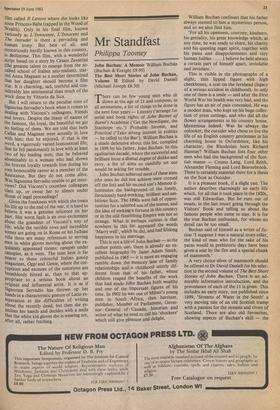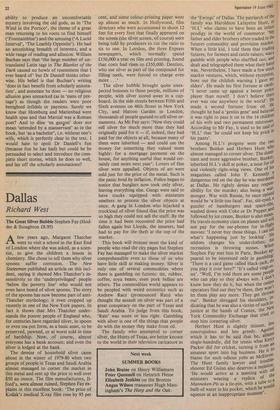Mr Standfast
Philippa Toomey
John Buchan: A Memoir William Buchan (Buchan &Enright £9.95) The Best Short Stories of John Buchan, Volume II Edited by David Daniell (Michael -Joseph £8.50)
There can be few young men who sit down at the age of 21 and compose, in all seriousness, a list of things to be done in the next four years — Literary (`arrange for serial and book rights of John Burnet of Barns') Academic ('Get the Newdigate, the Stanhope etc.') Probable Income, and Practical (`Take strong interest in politics — be called to the Bar'). William Buchan is a shade defensive about this list, compiled in 1898 by his father, John Buchan. In this egalitarian decade, where the successful and brilliant incur a dismal degree of dislike and envy, a list of aims so candidly set out would be asking for trouble.
John Buchan achieved most of these aims (the ones he did not achieve were crossed off the list) and his second son's Memoir il- luminates the background of the lonely, ferociously hard-working, brilliant and am- bitious Scot. The 1890s were full of oppor- tunities for a talented son of the manse, and the idea of seeking a fortune in this country or in the still flourishing Empire was not so strange. What is perhaps curious is that nowhere in this list appeared the words 'Marry well', which he did, and had lifelong happiness in his marriage. This is not a life of John Buchan — as the author points out, there is already an ex- cellent biography by Janet Adam Smith, published in 1965 — it is more an engaging ramble down the memory lane of family relationships and a childhood utterly dif- ferent from that of his father, whose children reaped the benefits of the work that had made John Buchan both wealthy and one of the important figures of his time. In 1902 he was one of Milner's young men in South Africa, then barrister, publisher, Member of Parliament, Gover- nor General of Canada, historian and writer of what he used to call his 'shockers' which still give pleasure and delight. William Buchan confesses that his father always seemed to him a mysterious person, and so we also find him.
'For all his openness, courtesy, kindness, his geniality, his great knowledge which, at any time, he was ready to share, his charity and his questing eager spirit, together with his pains and disappointments and very human foibles .... I believe he held always a certain part of himself apart, inviolable and inviolate.'
This is visible in the photographs of a slight, thin lipped figure with high cheekbones, a scar on the forehead (legacy of a serious accident in childhood). In only one of them is a smile — and after the First World War his health was very bad, and the figure has an air of pain concealed. He was a modest man, who kept up his huge collec- tion of press cuttings, and who did all the flower arrangements in his country house. Mysterious indeed. Was he always the onlooker, the outsider who chose to live the life of an English country gentleman in his charming house in Oxfordshire, like his character, the Rhodesian born Richard Hannay? William Buchan lists four other men who had the background of the Scot- tish manse — Cosmo Lang, Lord Reith, Alexander Fleming and Lord Beaverbrook. There is certainly material there for a thesis on the Scot as Outsider.
It is a pleasant book, if a slight one. The author describes charmingly an early life which, for all that it took place in the 1920s, was still Edwardian. But he runs out of steam, in the last resort going through the Visitors' Book and telling us about the famous people who came to stay. It is for the true Buchan enthusiast, for whom no detail can be too small.
Buchan said of himself as a writer of fic- tion 'I suppose I was a natural story-teller, the kind of man who for the sake of his yarns would in prehistoric days have been given a seat by the fire and a special chunk of mammoth.'
A very choice sliver of mammoth should be offered to Dr David Daniell for his selec- tion in the second volume of The Best Short Stories of John Buchan. There is an ad- mirably informative introduction, and the provenance of each of the 11 is given. This includes an early story, not published since 1899, 'Streams of Water in the South' a very moving tale of an old Scottish tramp with a passion for the streams and rivers of Scotland. There are also old favourites, showing aspects of Buchan's skill — the
ability to produce an uncomfortable mystery involving the old gods, as in 'The Wind in the Portico', the theme of a great man returning to his roots to find himself (`Fountainblue') and the amusing CA Lucid Interval', 'The Loathly Opposite'). He had an astonishing breadth of interests, and a wide range of reading and allusion. William Buchan says that 'the large number of un- translated Latin tags in The Blanket of the Dark caused no howls of resentment that I ever heard of ' but Dr Daniell thinks other- wise. His belief is that Buchan's writing 'does in fact benefit from scholarly annota- tion', and annotate he does — no religious allusion goes unmarked (as in 'mess of pot- tage') as though the readers were poor • benighted infidels or paynims. Surely we know that Homburg and Marienbad were health spas and that Martial was a Roman poet? And to dine 'en garcon' does not mean 'attended by a manservant' as in the book, but 'as a bachelor', i.e. without one's wife, which is perfectly clear in the text. I would hate to spoil Dr Daniell's fun (because fun he has had) but could he be persuaded to select and introduce the com- plete short stories, which he does so well, and lay off the scholarly annotations?





































 Previous page
Previous page